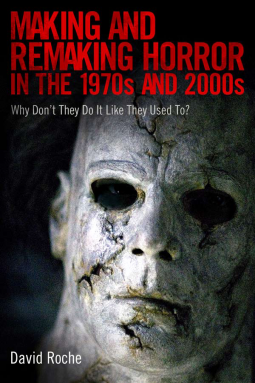Interrogating: Making and Remaking Horror in the 1970s and 2000s: Why Don't They Do It Like They Used To?
The internet has been whining for several decades that remakes are not as good or as scary as the originals. In Making and Remaking Horror in the 1970's and 2000's: Why They Don't Do It Like They Used To by David Roche the original vs. remake argument is thoroughly fleshed out. Roche targets his argument on four pairs of films: Halloween (1978/2007), Dawn of the Dead (1978/2004), The Hills Have Eyes (1977/2007), and Texas Chainsaw Massacre (1974/2003). Unlike the internet, David Roche is a competent philosopher with a ruthless argued set of points that digs into themes at topics such as race, ethnicity, class, the American family, gender, sex, remaking films, monsters, and mask. All the fun topics that horror movies are good at playing with.
I thought this book was a great read and left me more than a little jealous. There were several times during the chapters where I thought to myself, "Hey I totally thought that thought when I was watching this film!" What stood out to me was Roche's analysis of the political commentary, and conformity of the films. For instance the discussion about political contexts of American wars taking place during the creation of the two versions of the Hills Have Eyes. What I took out of it was that the originals were more willing to be commentary and the remakes were more willing to conform to social commentary (excluding Halloween. Roche argued that Halloween was an interesting critique of the slasher, and was more politically intelligent than the other remakes discussed). I recommend this book for horror fans that are philosophers!
This book is ultimately a study of adaptation. Roche, 2014, Loc. 335Roche demonstrates a deep knowledge of the horror genre and the philosophical apparatuses that he deploys in revealing the depths of all above mentioned film. This text assumes that the reader has at least viewed the four films he uses as examples and a general overview of film studies and philosophy. Unlike the pseudo philosophically texts like the philosophy of the Simpsons, Roche does not seek to insult your intelligence but to expand it. Roche has two main goals in this book; the first is to dig into and argue his thesis that the remakes are less disturbing than the original version and to unearth the cultural contradictions and criticisms that the films present. Making and Remaking Horror's formula is to introduce a topic in each chapter and methodologically dig thought each film one by one. Some may find this process repetitive. Although scenes and characters are returned to several times over the course of the text in each chapter they are looked at from new and interesting angles.
I thought this book was a great read and left me more than a little jealous. There were several times during the chapters where I thought to myself, "Hey I totally thought that thought when I was watching this film!" What stood out to me was Roche's analysis of the political commentary, and conformity of the films. For instance the discussion about political contexts of American wars taking place during the creation of the two versions of the Hills Have Eyes. What I took out of it was that the originals were more willing to be commentary and the remakes were more willing to conform to social commentary (excluding Halloween. Roche argued that Halloween was an interesting critique of the slasher, and was more politically intelligent than the other remakes discussed). I recommend this book for horror fans that are philosophers!
To what extent can the politics of these films be described as 'disturbing' insomuch as they promote subversive subtexts that undermine essentialist perspectives? Do the politics of the film lie on the surface or are they wedded into the film's aesthetics? Roche, 2014 Loc. 334


Comments
Post a Comment